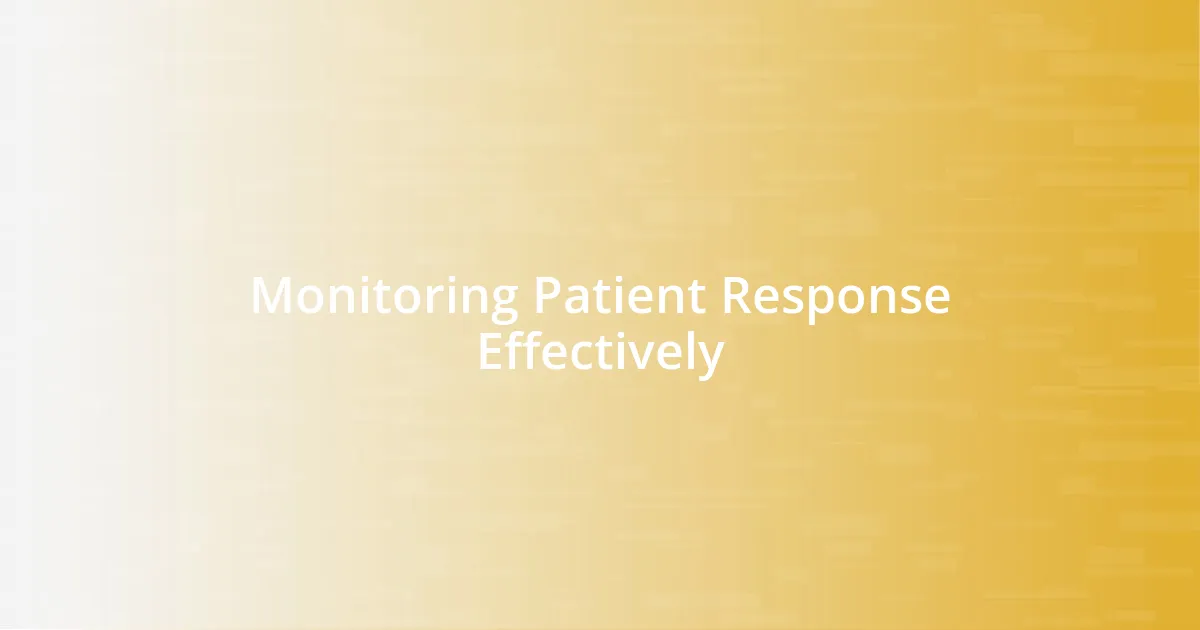Key takeaways:
- Incremental dosages allow for gradual medication adjustments, enhancing patient safety and comfort while monitoring effectiveness.
- Precise dosage calculations are crucial for preventing adverse effects, ensuring therapy efficacy, and allowing personalized treatment.
- Open communication with healthcare providers and detailed monitoring of responses can significantly improve treatment outcomes.
- Common mistakes include rushing dosage changes, neglecting to track side effects, and not advocating for personal comfort in treatment.

Understanding Incremental Dosages
When I first encountered the concept of incremental dosages, I found it fascinating how such a method could significantly impact treatment outcomes. Instead of jumping straight into high doses, healthcare providers often opt for gradual increases. This approach allows for better monitoring of tolerability and effectiveness. Have you ever tried a new medication and felt anxious about potential side effects? I certainly have, and I’ve learned through experience that starting low and adjusting slowly can ease that stress.
I remember a time when I was prescribed a medication to manage my anxiety. The doctor suggested a very low starting dose, which felt almost insignificant at first. However, over weeks, I realized it was just right for my system, providing comfort without overwhelming side effects. This personal experience reinforced my belief in the power of incremental dosages. It’s a thoughtful reminder that our bodies often need time to adjust, just like a new shoe may feel tight until it’s broken in.
Understanding incremental dosages is not just about numbers; it’s about the journey of healing. Each dose represents a small step forward, allowing both patients and providers to assess responses along the way. This method prioritizes individual needs, creating a more personalized treatment pathway. Have you ever thought about how small changes can lead to significant improvements over time? That’s precisely what incremental dosages aim to achieve.

Importance of Dosage Calculation
Dosage calculations are critical in ensuring patient safety and treatment efficacy. I recall a friend who experienced adverse reactions after a miscalculated dose of medication. This incident highlighted how even a small error in dosage can lead to significant consequences. The fine line between a therapeutic dose and toxicity often rests on precise calculations.
In my experience, understanding the mathematics behind dosage can feel daunting, yet it is essential. When I first studied pharmacology, I was intimidated by the formulas, but I soon recognized their importance. Proper calculations have the power to establish the right therapeutic range, reducing the risk of underdosing or overdosing. After all, no one wants to find out that a misjudged dose can lead to complications.
Moreover, repeated monitoring and adjustment of dosages, which are part of incremental dosages, rely on accurate calculations. I’ve seen firsthand how diligent adjustments to dosages based on patient feedback create successful outcomes. It’s not just about numbers; each calculation is a step toward providing safe, effective care. Isn’t it fascinating how a clear understanding of dosage can transform a patient’s journey towards healing?
| Key Elements | Importance |
|---|---|
| Patient Safety | Reduces risk of adverse effects |
| Treatment Efficacy | Ensures therapeutic levels of medication |
| Personalization | Allows for tailored treatment adjustments |

Guidelines for Safe Incremental Adjustments
Making incremental adjustments safely requires careful consideration and planning. I remember when I was on a new medication, and my healthcare provider carefully guided me through the process of small, gradual increases. It wasn’t just about dosing; it was a dialogue that involved my experiences and progress. Having that support made the experience much less daunting.
Here are some guidelines that I’ve found useful for safe incremental adjustments:
- Start Low: Begin with the lowest effective dose to minimize side effects.
- Adjust Gradually: Increase dosages slowly, allowing your body time to adapt.
- Monitor Closely: Keep track of any side effects or changes in how you feel during increments.
- Communicate Openly: Share your experiences and concerns with your healthcare provider.
- Be Patient: Understand that finding the right dose can take time, and it’s perfectly okay to ask questions.
Each step in this journey reminds me of learning to ride a bike. At first, it felt wobbly and nerve-wracking, but with each small push forward, I gained confidence and skill. Incremental adjustments work the same way; they help you build stability and control in your treatment.

Benefits of Incremental Dosage Approach
The incremental dosage approach offers a significant advantage by promoting patient safety. I remember starting a new treatment plan where the dosage was gradually adjusted based on how I felt physically and mentally. That same attentiveness to my reactions helped build my trust in the process, making the overall experience far less intimidating. Have you ever felt nervous about starting a new medication? Incremental adjustments can ease that anxiety by ensuring comfort at every step.
Another benefit of this approach is its ability to personalize treatment. I vividly recall a situation where my healthcare provider encouraged small dose modifications based on my individual response. This tailored method allowed us to strike a balance between efficacy and comfort. Isn’t it reassuring to know that your treatment plan can adapt to your body’s unique needs? This flexibility can lead to better outcomes and a more manageable experience overall.
Lastly, the incremental dosage approach fosters a deeper connection between patients and healthcare providers. I often found clarity in communicating how these careful adjustments affected my day-to-day life. Engaging discussions about dosage and its effects can profoundly impact a patient’s adherence to treatment. Isn’t it empowering to have that open dialogue? This connection not only enhances treatment efficacy but also strengthens the therapeutic relationship, creating a collaborative environment for healing.

Common Mistakes in Dosage Increments
One common mistake I’ve seen is rushing the process of dosage increments. I remember when I was eager to feel the full effects of a medication, and I pushed for higher doses too quickly. It’s easy to get impatient and overlook how our bodies need time to adjust. Have you ever felt like you wanted to skip a few steps to get to the goal sooner? That kind of eagerness can lead to unwanted side effects, making the entire experience more uncomfortable.
Another issue is not keeping detailed records during dosage changes. Early in my journey with a new treatment, I thought I could remember how I felt after each increment. It wasn’t until I hit a bump that I realized I needed better tracking. A simple chart helped me pinpoint what worked and what didn’t, and it’s remarkable how those insights guided my discussions with my healthcare provider. Wouldn’t it be useful to have that clarity when things get complicated?
Additionally, many people forget the importance of self-advocacy. I’ve often found myself hesitating to voice my concerns about a dosage that seemed too aggressive. Trusting my instincts took time, and if I hadn’t spoken up, I might have faced unnecessary challenges in my treatment. Have you ever second-guessed your feelings? Speaking your mind is vital; it opens up channels for adjustments that can drastically improve your experience.

Monitoring Patient Response Effectively
Monitoring patient responses is absolutely crucial in the incremental dosage approach. I’ve experienced firsthand how taking time to assess how I felt after each dosage change transformed my understanding of the treatment. Those quiet moments of reflection made a world of difference, didn’t they? It’s essential to check in regularly, ensuring that both the patient and the healthcare provider are aligned on how the treatment is progressing.
One technique I found effective was maintaining a daily diary about my symptoms and moods. I remember jotting down my thoughts each night and being surprised by how much clarity it brought me. The simple act of recording my experiences allowed me to identify patterns I hadn’t noticed before, turning the often-overwhelming process into something manageable and insightful. Have you ever tried tracking how you feel? This could be your breakthrough moment!
Moreover, effective monitoring involves more than just conversations; it requires keen observation of physical and emotional responses. In one instance, I noticed that my energy levels fluctuated significantly after increasing my dosage. By discussing these changes openly with my healthcare provider, we made informed decisions that aligned with my well-being. Isn’t it liberating to actively participate in your treatment journey? That ongoing dialogue reinforces the bond with your provider while tailoring the plan to fit your needs more precisely.

Tips for Successful Implementation
Implementing incremental dosages successfully requires a thoughtful approach. One of the best pieces of advice I can share is to create a flexible yet structured schedule for adjustments. I vividly remember marking my calendar with specific increment dates, which helped me stay on track without feeling rushed. Have you ever set a timeline that balanced anticipation and patience? It can truly empower you to embrace the gradual process while truly listening to your body’s needs.
It’s also essential to cultivate a support network during this journey. I often leaned on friends or forums to share my experiences and gather insights, which provided a sense of community. Did you ever feel isolated while navigating your treatment? Having others to talk to not only lightened the emotional load but also brought fresh perspectives that enriched my understanding of what I was going through.
Furthermore, being open to feedback from healthcare professionals is key. I recall a moment when I hesitated to express my concerns about a dosage adjustment; it turned out that engaging in candid conversations dramatically altered my treatment trajectory for the better. Wouldn’t it be great to find that sweet spot where your input aligns with your provider’s expertise? Embracing that two-way dialogue ensures that you feel heard, which can make all the difference in your approach to incremental dosages.















